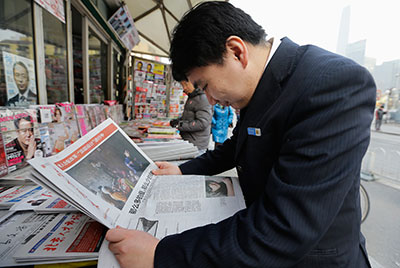Three days into his retirement, Zeng Li (曾礼) died yesterday at age 61, apparently of intestinal bleeding. Surprisingly, his March 28 farewell letter has spread across China’s social media sites and blogs. The letter is an apology, an explanation of sorts, and an admission of regret regarding the latter part of his career. Zeng served in Southern Weekly‘s internal censorship program–his title there most likely translates best as “news examiner.”
According to the Hong Kong-based South China Morning Post, Zeng’s farewell letter read, in part:
Looking back on the last four years, I made mistakes. I have killed some drafts that I shouldn’t have killed, I have deleted some content that I shouldn’t have deleted, but in the end I woke up, I would rather not carry out my political mission than go against my conscience, I don’t want be a sinner against history.
Zeng had come to a degree of prominence in January, when staff at the famously liberal weekly (also translated as Southern Weekend) went on strike for three days, protesting heavy handed censorship– rewriting, actually–of a Southern Weekly New Year greeting. The piece advocated constitutionalism and respect for rule of law, and was replaced with a pro-government message. Qian Gang, director of Hong Kong University’s China Media Project, says a blog post by Zeng, “Who Revised the New Year’s Greeting at Southern Weekly?,” was instrumental in bringing the ugliness of these censorship tactics to light.
Zeng was not the author of the January editorial that raised the furor, nor was he the government censor who rewrote the copy–that dubious distinction belongs to Tuo Zhen, the Guangdong provincial propaganda chief. Zeng’s role, one that had been established around 2008, was to head off exactly the type of confrontation over censorship that hit the paper in January. His job was to act like a buffer, moderating between the push for more open reporting–which came from field and writing staff and was driven by the growing expectation of readers who look to Southern Weekly for its more liberal, aggressive journalism–and the censors from the various departments of propaganda who watched for violations. He and others in the role were known as Old Comrades by the younger staff. His job wasn’t glamorous, and by its nature was intended to be anonymous, but the staff at the paper knew full well his role.
You might think that he was not admired by the staff at Southern Weekly, but the comments appearing online, especially on social media platforms, show an appreciation for the man and the role he played. His nickname was a respectful “Old Zeng” and there are many references to sharing a drink with him after work.
We examined China’s increasingly complex censorship regime– including the January blowup at Southern Weekly–in our special report, “Challenged in China: The shifting dynamics of censorship and control,” which is also available in Chinese as a PDF. It’s worth noting that the Chinese version has made it through China’s firewall (where CPJ.org seems to be regularly but not constantly blocked) and has been downloaded more than any other non-English PDF we have posted. It is still being widely circulated via social media. If you’re in China or communicating with colleagues there, it would be great if you could share it with those you know.
